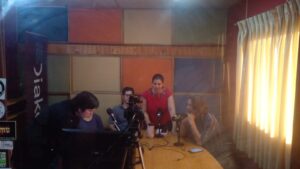The general election of April 30 was the big test for the recently formed Paraguayan Alternative Media Network, whose goal is to give visibility to issues underreported by traditional media. The network is "committed to a diversity of information sources and citizens' right to information" through collaborative journalism and fact-checking.

Transmisión y cobertura de las elecciones generales de Paraguay el 30 de abril de 2023. por parte de la Red Alternativa. (Foto: Cortesía Red Alternativa)
On election day, they carried out a live broadcast from noon to 6 p.m. (local time) which was available on all the Facebook pages of each of the news outlets that belong to the Network. Radio Fe y Alegría lent its studios and equipment for the broadcast, while journalists from news outlets hosted the program through interviews, analysis and connections with colleagues reporting from different parts of the country and abroad, where Paraguayans were also voting.
"Above all, we sought to contribute issues that were not covered by the mainstream media, such as: environmental claims, land and production issues of Indigenous peoples and peasant organizations, gender claims, education, health, use of technology, [and] energy sovereignty, which the candidates had avoided talking about or debating," said Desirée Esquivel, executive director of El Otro País, to LatAm Journalism Review (LJR). "But our main contribution has been the tasks of fact-checking, seeking to combat disinformation, something that the traditional and corporate media do not do in a direct way."
Days before, on April 26 — the date on which Paraguay commemorates Journalists' Day — the Network had its official launch with a panel organized by Sembramedia and the Universidad Autónoma de Asunción. The ten media that make up the Network were introduced: in addition to El Otro País, there are also Ciencia del Sur, El Surtidor, El Urbano, Hína, La Volanta, Made In Paraguay, OviedoPress, Periódico E'a and Revista Y.
In their presentation, they also talked about what they were planning for election day [on April 30] and the special they had made on April 24. On that day, the Network's news outlets published, simultaneously, investigative reports, articles of analysis, interviews and fact-checking stories, united in social networks with the hashtags #EleccionesPY2023 and #Otramirada.
For Esquivel, the experience of the #RedAlterNativa — as they wish to position themselves on social media — during these elections “was very important, both to let the audience know about the existence and strength of new digital media, and to realize among ourselves, editors and journalists, how much we can accomplish by joining efforts through collaborative journalism work.”
If there was ever a lesson on a journalistic level that the COVID-19 pandemic left us, it is undoubtedly the importance and value of collaborative journalism in any country. Paraguay has not been oblivious to this reality, and for Esquivel, it is precisely this lesson that gave rise to what the network is today.
The origin of the Network can be traced to December 2022, when Paraguay went through internal elections — a kind of primary elections in which each party chooses its representatives. On Dec. 11, a week before elections, the network media published joint reports, but in their conversations they noticed it was not enough.

Cobertura especial de las elecciones generales de Paraguay el 30 de abril de 2023 por parte de la Red Alternativa. (Foto: Cortesía Red Alternativa)
Although it was not a particularly serious problem as "it was felt in Brazil," disinformation "is growing" in Paraguay, Andrés Colmán Gutiérrez, editorial director of El Otro País, told LJR. For example, according to Colmán, in the context of the elections, issues such as religion and educational reform were the target of large waves of false information.
For this reason, the first project the network thought about focused on fact-checking almost exclusively. Taking advantage of El Surtidor's experience with its La Precisa initiative — the only one focused on fact-checking in Paraguay — they thought of fact-checking candidates during presidential debates. However, since the debates were canceled due to the refusal of one of them to participate (today's president-elect), the Network's plan had to change.
Since each of the news outlets has a particular specialty: either because of the type of journalism they do (solutions, visual, data) or the topic they cover (science, politics), the network decided to cover the elections by reporting on underreported topics, taking into account the different regions, but especially respecting the particularities of each news outlet.
"[We do] reporting following our own editorial line, but always under the purview of a different glance," Colmán said. "We’re not going to do the coverage that traditional media do, but we’re rather going to try to give voice to a citizen’s approach, from social organizations and having a critical look at the elections."
Esquivel says that, despite the fact that the live fact-checking project during the presidential debates could not be carried out, the network's media recognize the importance of these initiatives. For this reason, as part of the joint work, each news outlet carried out four fact-checkings between April and May. Likewise, together with El Surti, they will create a large directory of disinformation on social media and its verifications, which will be available for browsing by the audience.

Red de Medios Alternativos del Paraguay logo.
Now that this year’s elections are over, the Alternative Network knows they have a more demanding job ahead of them. The election of Santiago Peña as president meant the continuity of the Colorado Party, which has a conservative approach and has been in power for seven decades with only one interruption. Peña’s election sparked protests, but it also showed that, although it is not united, there is a strong opposition to this party.
"This panorama makes independent and alternative journalism even more necessary to exercise citizen control. But, above all, to provide communication that lets us continue building projects for the construction of a better society," Esquivel said. "From this perspective, we will continue working together to strengthen our respective news outlets and at the same time continue coordinating efforts in the Alternative Network, with new joint projects and programs."